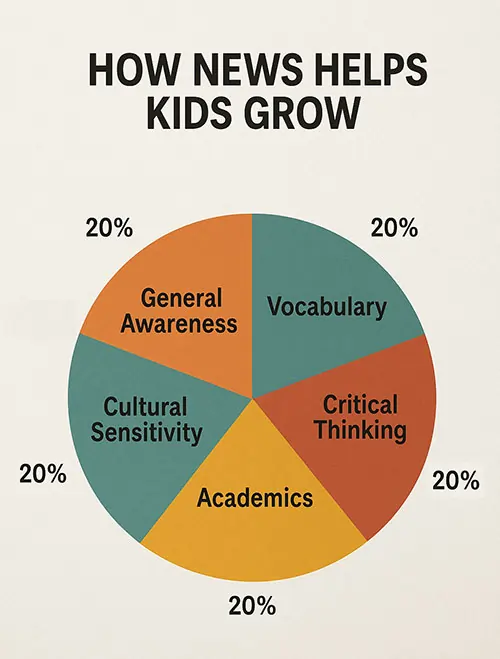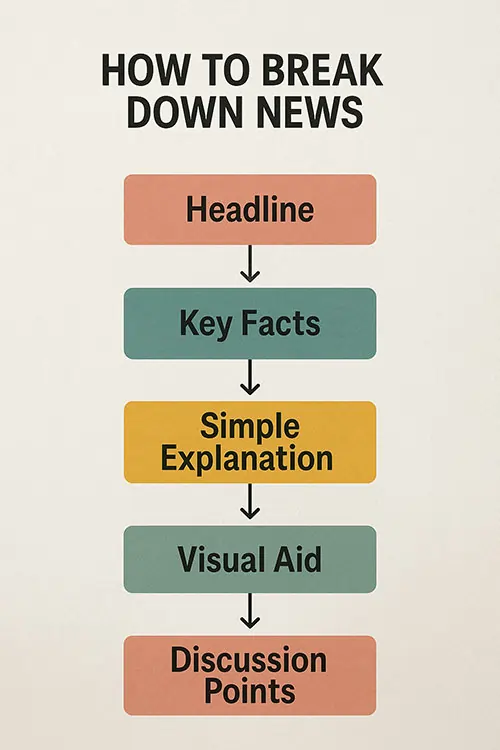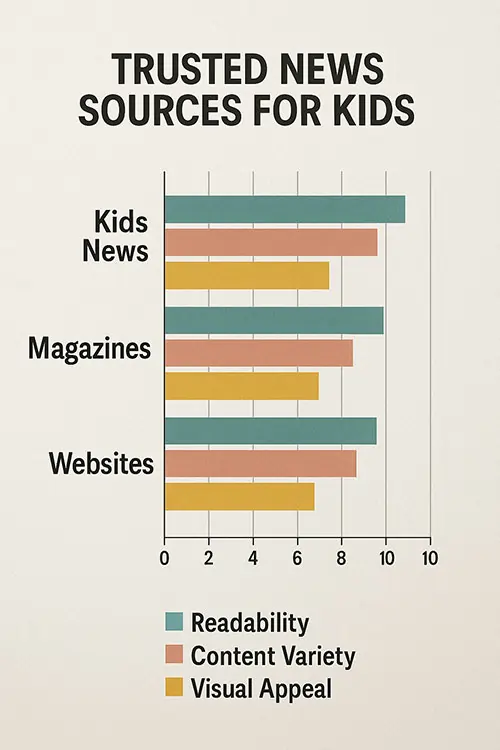Why Kids Should Follow Current Affairs: A Fun Learning Habit
It’s more important than ever to stay up to date in today’s fast-paced world, and this goes for kids as well as adults. It’s not about giving kids too much serious news when you want them to pay attention to current events. Instead, it’s about encouraging a love of learning, curiosity, and critical thinking. With the right tools and techniques, current affairs for kids can be both educational and entertaining.
1. The Importance of News for Kids
Kids who learn about the world around them become informed, caring, and responsible adults. Here are some important reasons why you should encourage your kids to read the news:
| Benefit | Description |
| General Awareness | Kids learn about events that happen around the world, in their own country, and in their own neighborhood. |
| Vocabulary Development | They can learn new words by reading about a wide range of subjects. |
| Critical Thinking Skills | Analyzing about different points of view helps you think more clearly. |
| Cultural Sensitivity | Learning about other countries helps people understand and respect each other. |
| Academic Improvement | A lot of the time, news stories are about things that are also taught in school, like science, history, and geography. |

2. How to Simplify News for Kids
News doesn’t have to be boring or too much to handle. It can be interesting and appropriate for kids with a few changes:
a. Use Kid-Friendly Language
Don’t use jargon or hard-to-understand political terms. Use language that kids can understand and relate to.
b. Focus on Positive News
Mix in good news stories about inventions, wildlife conservation, or young heroes with serious issues.
c. Break Down Complex Topics
For instance, use a candy store where prices go up over time to explain inflation.
d. Use Visuals
Use comic strips, cartoons, and pictures to tell stories in a way that people can understand.

3. Best Sources for Current Affairs for Kids
It’s very important to pick the right source. These are some platforms that kids can use:
| Source | Type | Key Features |
| KidsWorldFun.com | Website | News, fun facts, educational games |
| Time for Kids | Magazine/Website | Current affairs for kids in bite-sized stories |
| National Geographic Kids | Magazine/Website | Science, animals, and global news |
| DOGO News | News Website | News website that has news articles with vocabulary help and videos that go with them |
| BBC Newsround | TV/Web | UK-based kids’ news show that has videos to help explain things |

4. Make It Interactive: Quizzes
Quizzes are a great way to have fun while learning more. They help: – Check understanding of current events – Help people remember facts – Make yourself more competitive in a healthy way.
Sample Quiz Table
| Question | Options | Correct Answer |
| Who is the current President of India? | A) Modi B) Murmu C) Gandhi | B) Murmu |
| What is the capital of Australia? | A) Sydney B) Canberra C) Perth | B) Canberra |
| Which planet is known as the Red Planet? | A) Earth B) Mars C) Venus | B) Mars |
Tip: Many websites like KidsWorldFun and DOGO News include weekly or monthly quizzes.
5. Encourage Healthy Debates
Another fun way to get kids interested in current events is to have them debate. It makes things better: – Speaking skills – How to make an argument – Self-confidence.
Debate Topics for Kids
| Topic | Pro Points | Con Points |
| Should school uniforms be mandatory? | Promotes equality, less distraction | Limits expression, may be uncomfortable |
| Should mobile phones be allowed in school? | Helpful for learning and emergencies | Distraction, possible misuse |
| Is online learning better than classroom? | Flexible, tech-savvy, saves time | Less social interaction, screen fatigue |

6. Making Current Affairs a Daily Habit
Making news a fun part of a child’s day can help them get used to it.
Ways to Build the Habit
- Morning News Ritual: Read the headlines together for 10 minutes.
- News Journal: Kids can write down what they learned each day.
- Family Discussions: Talk about the news at the dinner table with your family.
- Storytelling Time: Change the news into a short story.
- Using Apps: Use news apps for kids that have interactive features.
Weekly News Learning Schedule
| Day | Activity |
| Monday | Watch a 5-minute kids news video |
| Tuesday | Do a quiz from the news learnt |
| Wednesday | Read an article and explain it to family |
| Thursday | Write a news journal entry |
| Friday | Participate in a debate or discussion |
| Saturday | Create an infographic or drawing |
| Sunday | Free choice: explore any news topic |
Conclusion
It’s not necessary to show kids every bad headline to get them interested in current events. It’s about encouraging people to be curious, learn new things, and have fun while doing it. Kids news websites, interactive quizzes, and lively debates are all ways for kids to learn about current affairs that can really change their education. We get kids ready to understand and change the world around them by making news easy to find, interesting, and a part of their daily lives.

